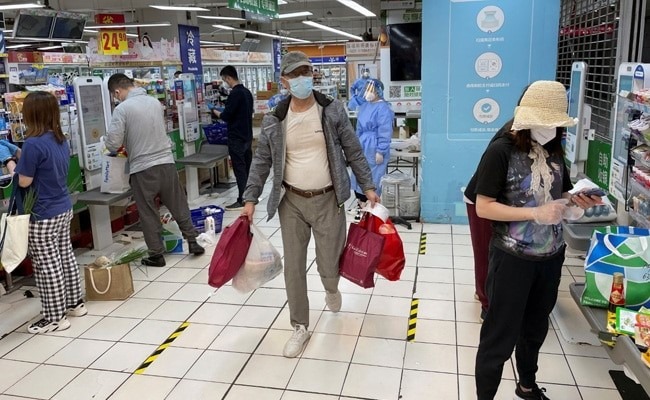| Translate This News In |
|---|
On Thursday, more Shanghai residents were allowed to go grocery shopping for the first time in over two months, as officials laid out further plans for entirely exiting the city-wide COVID-19 lockdown.
The commercial metropolis of 25 million recorded no new infections outside confined regions for the sixth day in a straight, further confirming its “zero COVID-19” status with each passing day.
“I’m extremely glad, the lockdown is being lifted,” shopper Zhong Renqiu said at a newly reopened Carrefour supermarket in central Changning.
“We’ve mostly relied on government provisions and group purchases,” said Zhong, who was loading up on eggs, goji berries, black sesame, and oats.
However, officials are concerned about the risk of additional outbreaks of infection in their high-stakes drive to gradually re-open, and are intending to keep most inhabitants primarily indoors this month, prioritising work and production over other activities.
Deputy Mayor Zhang Wei stated that economic activity had begun to return, with enterprises able to operate with workers living on-site, and that officials will allow more businesses to resume normal operations beginning in early June.
He stated that the city was “working hard to ensure a full restoration of work and output as quickly as feasible.”
“The rhythm of work return” will be determined by the COVID-19 situation, he added, adding that on-site work limitations would continue in effect for the end of May.
On Thursday, residents of some Changning housing estates were given credentials to enter the Carrefour supermarket.
The permits allowed one member from each family to shop for up to 500 yuan ($74) for 40 minutes. Residents were instructed to walk or ride their bicycles to the store and to line up two metres apart at the entrance.
Some customers were wearing protective gowns, while others were wearing face shields and gloves.
Another encouraging indicator is that four of the city’s 18 metro lines will resume service on Sunday.
There were just about 800 new cases recorded in Shanghai. For the seventh day in a row, no one came from outside isolated areas.
Beijing, the capital, has not declared a city-wide lockdown, but has gradually tightened restrictions over the last month to contain a tiny but persistent outbreak of a few dozen new cases per day. It recorded 55 new cases for May 18, a decrease from 69 the previous month.
Life Signs
According to Deputy Mayor Zhang, Shanghai’s economy is gradually returning to normal, with daily container throughput at its ports at 90 percent of what it was a year ago.
Pudong Airport cargo throughput has reached 70% of last year’s levels, while the number of freight vehicles entering and departing the city has returned to two-thirds, he said.
According to the democratically run island’s finance minister, roughly half of Taiwanese enterprises that had ceased operations in China due to COVID-19 had resumed operations.
Retail automobile sales in China increased 27 percent in the first half of May compared to the same time in April, according to data.
However, they were down 21% from the previous year.
COVID-19 limitations in May were less harsh and extensive than in April, but they nonetheless weighed on growth.
Goldman Sachs dropped its 2022 economic growth prediction for China to 4% from 4.5 percent, significantly below the government’s declared aim of around 5.5 percent, and cautioned that it could fall even more.
China’s “zero COVID” policy has subjected hundreds of millions of people in dozens of locations to varied restrictions, disrupting global production and enterprises ranging from Apple and Tesla to Starbucks and Walmart.
The New York Federal Reserve noted in its latest update to a global index of supply difficulties that air freight costs between the United States and Asia increased in April, while delivery delays increased everywhere.
This might lead to global inflation and higher borrowing prices.
Burberry, the British luxury company, said on Wednesday that its future were dependent on how quickly China, its largest market where sales had plummeted, recovered from lockdowns.


















